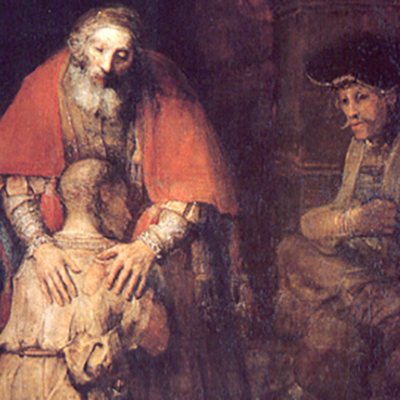

Where Am I Falling Short In Love? — An Examination of Conscience
Where Am I Falling Short In Love? — An Examination of Conscience

The following examination of conscience has been adapted from Christopher West’s book Love Is Patient but I’m Not: Confessions of a Recovering Perfectionist (Wellspring Books/Beacon), which is based on Pope Francis’s reflections on Saint Paul’s famous hymn to love in 1 Corinthians 13. At its most basic level, every genuine examination of conscience asks the question: Where am I falling short in love? This is why Saint Paul’s hymn to love makes an excellent examination of conscience.
Love is patient…
Pope Francis insightfully observes that we “encounter problems whenever we think that relationships or people ought to be perfect… Then everything makes us impatient, everything makes us react aggressively. Unless we cultivate patience,” he concludes, “we will always find excuses for responding angrily” (Joy of Love 92). Love is patient. Oftentimes, I am not. Lord, teach me to love.
- How do I respond to others’ and my own faults throughout the day? Am I willing to “give room” to people to be who they are – foibles and all – without demanding they be who I want (or “need”) them to be? Am I quick to react with dismay, disdain, or aggression?
- Am I quick (internally or externally) to criticize people who annoy me because of the way they act or think? If so, what underlying attitudes do I use to justify the idea that these people should think or act the way I do?
- Who are the people in my own life whom I must forgive for not being patient with me in the foibles and failings of my own humanity?
Love is kind…
The word Saint Paul uses here indicates that love benefits and helps others by spending oneself without expecting anything in return. Lord, when I’m focused on myself, spending myself for others is a burden I’d prefer to avoid. Teach me to love!
- Saint Mother Teresa would often say that we must love “until it hurts.” What is my honest reaction to that idea?
- Sometimes a person’s motives in serving others remain mixed with self-serving (I may serve others for the praise of doing so or to reinforce a prideful sense of myself as a virtuous person, etc.). Do I honestly serve others for others, expecting nothing in return?
Love is not jealous …
Love is concerned for, desires, and rejoices in the good fortune of others. Jealousy at others’ good fortune is thus a sign of love’s absence. Love is not jealous. Sometimes I am. Lord, teach me to love.
- When other people prosper in ways I desire to prosper, am I happy for them or only sad for myself?
- Am I grateful for and content with the good things with which God has blessed me? Do I sometimes grumble that I haven’t been granted what so-and-so has?
- Am I generous in sharing my good fortune with others? How can I be more so?
- Who are the people in my life – past or present – whom I’ve felt threatened by because of their achievements? Have I harbored resentment toward them? Have I been cruel to them in thought or deed because of a hidden envy?
- Are there relationships in my life – past or present – in need of healing because of the ways I behaved in my jealousy?
Love is not boastful…
Those who love do not speak too much about themselves. Rather, they are focused on others. Love does not seek vainglory or to be the center of attention. Sometimes, I do. Lord, teach me to love.
- What are ways that I seek to draw attention to myself? What am I looking for, what am I desiring when I do so?
- “If I glorify myself,” says Jesus, “my glory is worth nothing; but it is my Father who glorifies me” (Jn 8:54). What does this mean in my own life?
Love is not arrogant …
The word Saint Paul uses here means that we do not become “puffed up” before others, but we humbly accept human weakness – our own and others’. Lord, how can I embrace others in their weakness when I often loathe my own weakness and hide behind masks of having it together? Free me from the lies that see weakness as something unlovable, something to be rejected. Teach me to love!
- The Gospel teaches us that the first shall be last and the last shall be first. Do I live out this logic in my own life? Do I allow it to call out my arrogance and pride?
- Are there hidden (or not so hidden) ways in which I consider myself superior to others?
- Do I secretly loathe myself when my weaknesses are on display? Do I loathe others when their weaknesses are on display?
Love is not rude…
Those who love are thoughtful and gentle. They’re not impolite, harsh, abrasive, or rigid. The word Saint Paul uses also indicates that love honors the freedom of others as well as their limitations. Love does not expect from others what only God can provide. Sometimes I do. Lord, teach me to love.
- Whom do I need to forgive for being rude to me? From whom do I need to ask forgiveness for being rude?
- Am I demanding or domineering in seeking “what I want” in my relationships? Do I fail to respect the freedom of others because their desires conflict with mine?
- In what ways have I turned to human relationships to fill the void in me that only God can fill?
Love does not insist on its own way…
This means that love does not demand its own interest, but is ready to sacrifice them for the sake of the interests of others. Lord, sometimes I battle to let go and defer to others. Teach me how to love.
- In what ways – little or large – am I quick to assert my own interests and override the interest of others?
- In what ways can I commit myself to “dying” to my own interests in order to show concern for the interest of others?
Love is not irritable…
Being irritable has to do with a hidden agitation that we foster internally rather than bearing with and forgiving one another. Such irritation, unchecked, can grow into a hostility waiting to erupt. Love is not irritable. Sometimes I am. Lord, teach me to love.
- Referring to the “clicking noises” that a sister in her community made when sitting behind her during times of meditation, Saint Therese of Lisieux admitted that “it would be impossible for me to tell you how much this little noise wearied me.” Therese, however, learned to offer her irritation as a prayer to grow in love toward this person. What are the things others do in my life that irritate me? Have I fostered that irritation?
- What do I think I will accomplish by watering the weeds of irritation instead of uprooting them? What hidden satisfaction am I finding in doing so?
Love is not resentful…
Here, love requires a generous openness to understanding, to forbearance, and forgiveness. This isn’t easy. In fact, the Catechism puts it plainly: “It is not in our power not to feel or to forget an offense…” What, then, are we to do with the pain? The Catechism goes on to say that “the heart that offers itself to the Holy Spirit turns injury into compassion and purifies the memory in transforming the hurt into intercession” (2843). Over time, as we learn to welcome the Holy Spirit in our pain, he teaches us how to suffer-with (com-passion) those who have caused us suffering, transforming the pain itself into intercessory prayer for those who have hurt us.
- Forgiveness does not mean saying “it’s okay” or pretending nothing happened. It means surrendering those who have hurt us to the justice and mercy of God. Have I withheld forgiveness from anyone who has wounded me? Do I still need to process the pain others have caused me in order to grant that forgiveness?
- Often times we are innocent victims of others’ pain, and the fact that God allowed it can make us feel abandoned by God. Christ himself cried out from the Cross: “My God, my God, why have you abandoned me!?” In our own cry of abandonment, whether we realize it or not, we are deeply united with Christ in this cry. Working through our anger at God is not a sin. But have I closed my heart to him in the process?
- What were my relationships like with loved ones growing up (parents, siblings, etc.)? Was I loved unconditionally in my mistakes, foibles, and weaknesses? Was I mocked or harshly criticized? Who in my family of origin do I need to forgive for failing to love me as I am?
Love does not rejoice at wrong but rejoices in the right…
The expression translated “rejoice at wrong” has to do with taking some delight in that which is an injustice towards another, that which is contrary to the dignity of the person. Rejoicing in the right expresses the opposite – an attitude of delighting in and fighting for the true goodness and dignity of the human person. In this context, it is fitting to examine our conscience regarding our sexual attitudes and behaviors.
- Do I “rejoice in the right” of God’s marvelous plan for sexual identity, sexual desire, and sexual love or do I foster ideas and attitudes that treat others as objects for my own or others’ selfish pleasure? Am I master of my own sexual desires, or do they master me? How can I grow in “the freedom for which Christ has set me free”?
- What is my honest attitude toward pornography and the men and women who pose for it – not the attitude I think I should have, but the attitude I actually have? Do I take delight at their expense? Do I “rejoice in the wrong” of any kind of sexual exploitation of others?
- In God’s glorious plan for making us male and female, marriage, sex, and babies are tightly linked together – and in that order. Have I introduced disorder into this beautiful order through any form of non-marital sex (including masturbation, contracepted sex, or homosexual behavior)?
- What distorted or diseased ideas and images of the body and of sexuality am I in need of surrendering to the Lord? Have I ever invited God’s healing light into my ideas and attitudes toward my own body and sexuality?
Love bears all things…
To say love “bears all things” is to recognize that love co-exists on earth with imperfection. Love recognizes the danger of idolizing human relationships, expecting them to provide what only heaven can offer. In turn, love holds its peace before the limitations of others and this refers to the use of the tongue. Being willing to speak ill of a person is the opposite of “bearing all things.”
- Are there ways that I demand perfection out of human love? How does this affect me when the imperfections of others inevitably surface?
- In what ways have I failed to “hold my peace” and allowed my tongue to hurt others? Have I spoken ill of people with a desire to cause them harm or paint a negative picture of them in the mind of others? What were my hidden motivations for doing so?
- How can I humble myself in seeking reconciliation with those whom I have hurt with my tongue and in making amends? Do I need to forgive anyone who has spoken negatively of me?
Love believes all things…
The word Saint Paul uses here is closer to “trust.” With this deeply rooted trust, love sets free, it does not try to possess, control, or dominate. Love does not live in a permanent state of suspicion toward others. Even in very compromised and trying circumstances, as Pope Francis says, love trusts in the “ember glowing beneath the ash.”
- How have my personal insecurities affected the way I relate with others? Do I seek in subtle or not so subtle ways to control or dominate people and situations? How can I foster the freedom and independence of the people I love?
- Is the notion that God loves me unconditionally just a pious idea or a lived experience in my life? Am I hiding myself from God in any way because I don’t trust in his unconditional love?
Love hopes all things…
Hope, in the full Christian sense of the word, is the “virtue by which we desire the kingdom of heaven and eternal life as our happiness, placing our trust in Christ’s promises” (CCC 1817). In heaven, all our failings, infirmities, weaknesses, and sins will be transformed and we will shine in resurrected goodness and beauty. This helps us amid the aggravations of this present life – aging and death being chief among them – to see each person in the light of the future resurrection of the body “and await the fullness that he or she will receive in the heavenly kingdom, even if it is not yet visible” (Joy of Love 117).
- We worship that in which we invest ultimate worth (“worth-ship”). When we seek ultimate happiness in anything less than that which is of ultimate worth (God), we are worshipping a false god. To what or whom do I turn in my hope and desire for satisfaction of the deepest desires of my heart? Have I made false gods of anything on this earth?
- Everyone must face the reality and fear of aging and dying – our own and that of those we love. In the face of that fear, where do I place my hope (not where do I think I’m supposed to place it, but where do I actually place it)? Am I hoping in science? Am I hoping in make-up or cosmetic surgery? Or am I truly hoping in the resurrection of my body?
- Does the thought of my own death or the death of loved ones cause despair? What can I do to foster a love in my heart that “hopes all things,” a love that is “stronger than death”?
Love endures all things …
This means that love bears every trial with trust and a constant readiness that never gives up, even in the darkest hour. Love does not become despondent in the face hardships or in the face of human sinfulness (one’s own or others’). Trust in God’s merciful plan to set all right allows us to carry on in joyful hope and to be a channel of God’s love and mercy in other people’s hardships and sinfulness. Lord, I’m often tempted to bitterness and resentment because of the trials that I and others must endure in this life. Teach me to love.
- Are there sins, trials, or hardships in my own life or the life of others that I think are beyond God’s merciful reach?
- Do I live in fear of the trials and hardships I or others I love may face?



